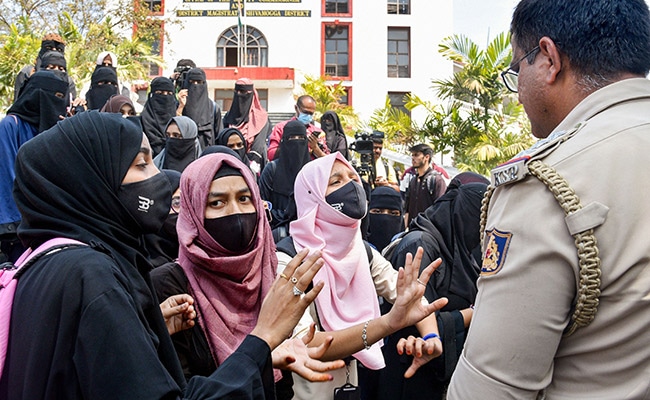The Karnataka government has announced that the prohibition on wearing hijabs in educational institutions will remain in effect as the issue awaits resolution in the Supreme Court. State School Education and Literacy Minister Madhu Bangarappa confirmed this decision during a press briefing ahead of the upcoming Secondary School Leaving Certificate examinations.
Minister Bangarappa stated that, due to the pending legal proceedings, the existing dress code policies, which include the ban on hijabs, will continue to be enforced. He emphasized the government’s commitment to adhering to the current legal framework until the Supreme Court delivers its verdict.
The controversy surrounding the hijab in Karnataka’s educational institutions began in early 2022 when a group of female students at the Government Pre-University College in Udupi district were denied entry for wearing hijabs, citing a violation of the college’s uniform policy. This incident sparked widespread debates and led to similar actions in other institutions across the state.
In response to escalating tensions, the Karnataka government issued an order on 5 February 2022, mandating that uniforms be worn compulsorily where policies existed, effectively prohibiting religious attire, including hijabs, in such institutions. This directive was challenged in the Karnataka High Court, which, on 15 March 2022, upheld the government’s order, ruling that the hijab is not an essential religious practice in Islam and thus not protected under Article 25 of the Indian Constitution.
The High Court’s decision was subsequently appealed, and the matter is currently under consideration by the Supreme Court. In October 2022, a two-judge bench of the Supreme Court delivered a split verdict on the issue, leading to the case being referred to a larger bench for further deliberation.
As the SSLC examinations approach, concerns have been raised regarding the enforcement of the dress code and its impact on students. Educators have expressed the need for clear guidelines to prevent confusion and ensure a smooth examination process. A headmaster of a government school in Bengaluru noted the importance of definitive instructions to avoid any disruptions on exam day.
The hijab ban has elicited varied responses from different sections of society. Proponents argue that uniformity in dress codes promotes equality and secularism within educational environments. Conversely, critics contend that the ban infringes upon individual religious freedoms and disproportionately affects Muslim female students’ access to education.
In September 2024, Minister Bangarappa addressed concerns related to the treatment of students in the context of the hijab controversy. He highlighted issues regarding the conduct of certain educational authorities, emphasizing the need for sensitivity and respect towards students’ rights and dignity.




 Unprecedented Crowds Challenge Authorities in Prayagraj and Ayodhya
Unprecedented Crowds Challenge Authorities in Prayagraj and Ayodhya 